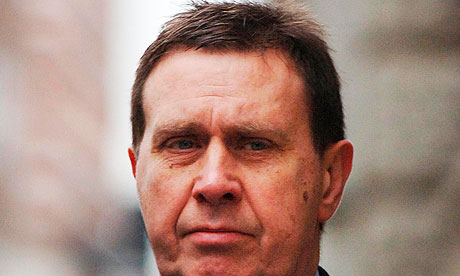Phone hacking: Panorama to name sixth journalist in News of the World scandal
Hacker hired by senior News of the World executive to intercept emails, BBC documentary says

The News of the World phone-hacking scandal is set to reach a new peak of embarrassment for the paper and for Scotland Yard with the naming of the sixth and most senior journalist yet to be implicated in illegal news-gathering.
The embarrassment is heightened by the fact that the target was a former British army intelligence officer who had served in Northern Ireland and was in possession of secrets which were deemed so sensitive that they had been suppressed by a court order.
Rupert Murdoch's News International, which owns the News of the World, has claimed repeatedly that only one of its journalists – the former royal correspondent, Clive Goodman – was involved in illegal news-gathering.
When Goodman was jailed in January 2007, Scotland Yard chose not to interview any other journalist or executive on the paper.
And Panorama reports that the illegal interception of emails happened in July 2006, when the prime minister's former media adviser Andy Coulson was editing the paper.
Panorama obtained details of a fax sent to the office of Marunchak on 5 July 2006, apparently containing copies of emails which had been written by Ian Hurst, a former army intelligence officer.
Marunchak was then based in the News of the World's Dublin office, editing the Irish edition.
Hurst was believed to be involved in writing a book titled Stakeknife, eventually published under the pseudonym Martin Ingram, which details the alleged involvement of British intelligence in assassinations in Northern Ireland.
Hurst had been the subject of court orders obtained by the Ministry of Defence.
Panorama traced Hurst and showed him the fax.
He confirmed on camera that the emails had come from his computer. "The hairs on the back of my head are up," he told them. Hurst then contacted a specialist hacker who he suspected was responsible, met him in a local hotel and confronted him, while the BBC secretly filmed the exchange.
The hacker – whose name cannot be revealed for separate legal reasons – confessed his role and added: "It weren't that hard. I sent you an email that you opened, and that's it ... I sent it from a bogus address ... Now it's gone. It shouldn't even remain on the hard drive ... I think I programmed it to stay on for three months."
Hurst then asked the hacker who had commissioned him to do this. The hacker replied: "The faxes would go to Dublin ... He was the editor of the News of the World for Ireland. A Slovak-type name. I can't remember his fucking name. Alex, his name is. Marunchak." Marunchak declined to answer questions when the BBC confronted him.
The BBC claim that Marunchak was introduced to the specialist hacker by Jonathan Rees, the private investigator whose involvement with corrupt police officers was detailed by the Guardian on Saturday.
Internal News International records show that Marunchak regularly employed Rees from the late 1990s, and that during 2006, the News of the World paid Rees more than £4,000 for research relating to Stakeknife, the codename for the British intelligence mole inside the IRA whose activities were known to Ian Hurst.
Marunchak is the sixth News of the World journalist to be implicated in the affair.
Documents published by the Guardian in 2009 include an email containing the transcripts of 35 illegally intercepted voicemail messages, sent by a junior reporter, Ross Hindley, for the chief reporter, Neville Thurlbeck.
Paperwork disclosed in court cases suggests that Clive Goodman, Ian Edmondson and Greg Miskiw commissioned phone-hacking. Goodman was jailed; Edmondson has been sacked but not charged with any offence; Miskiw is believed to have been interviewed by police in 2005 but never charged with any offence.
Monday's edition of Panorama includes an interview with Sean Hoare, the News of the World's former showbusiness writer, who last year told the New York Times that Andy Coulson had actively encouraged him to hack voicemail. Hoare tells the programme that the news desk commissioned private investigators to access targets' bank accounts, phone records, mortgage accounts and health records.
The former deputy assistant commissioner of Scotland Yard, Brian Paddick, who believes his own voicemail may have been intercepted on behalf of the News of the World, told the programme "I think that the new investigation should be carried out by an external force and it should be independently supervised. Otherwise, certainly some of the victims of phone-hacking will not be satisfied that the thing has been investigated thoroughly."
In a separate development, the Director of Public Prosecutions, Keir Starmer QC, has taken the unusual step of publicly challenging a senior serving police officer, who has been closely involved in the hacking affair.
In a letter published in the Guardian, Starmer accuses the assistant commissioner of the Metropolitan police John Yates of quoting him out of context in attempting to justify evidence which he has given to two parliamentary select committees.
In the House of Commons last week, Chris Bryant MP said that Yates had misled the committees by claiming that it is illegal to hack voicemail messages only if they have not already been heard by the intended recipient.
This was a key factor in justifying the Yard's claim that there was only a small number of victims of the News of the World's activities. Yates wrote to the Guardian defending his position and quoting a sentence from evidence submitted by the DPP's office to one of the select committees.
However, in his letter to the Guardian, Keir Starmer says it was "regrettable" that Yates used this sentence out of context; that the original prosecution did not use this interpretation of the law; and that this interpretation had no bearing on the charges brought or the legal proceedings generally. "The issue simply did not arise," he writes.
